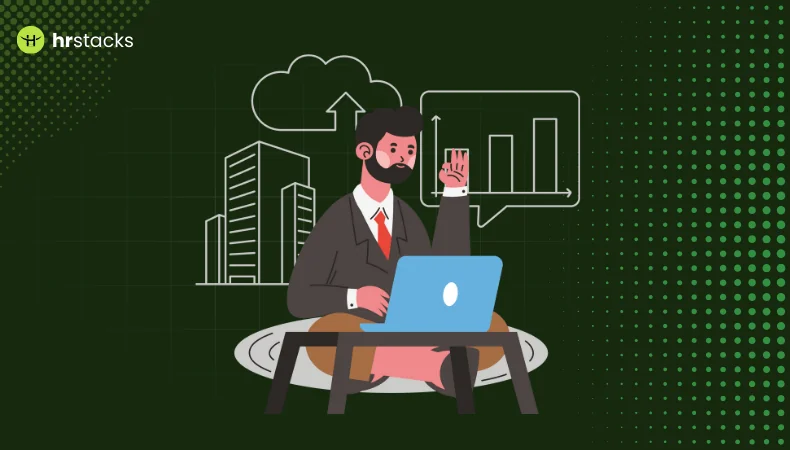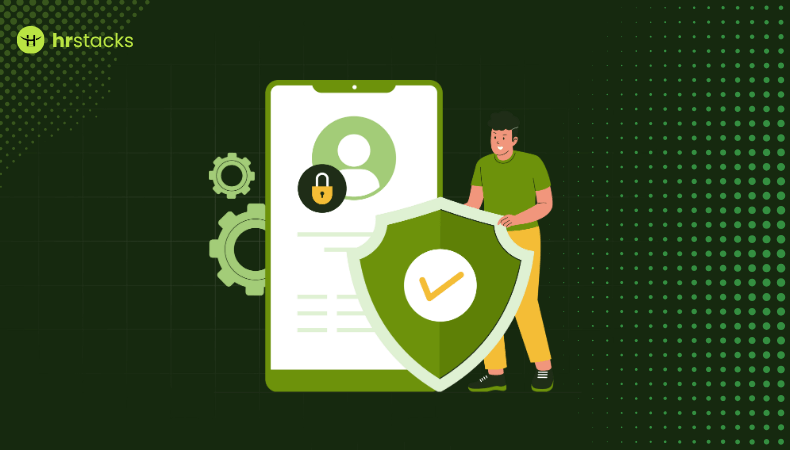Hope you find this collection of top HR Software helpful. We have published a number of similar software collections that you may read next.
Top HR Software Quick Comparison
Before we check the list of top HR Software , here's a quick view of top solutions that you may use. Get on with our detailed list of products below in the article.

Subscribe to HR Stacks Newsletter
Get our biweekly Human Resource newsletter with latest updates, AI in HR and news updates
Top HR Software
Free Trial: No
Starting Price: Custom Pricing
About Pebl
Company Name: Velocity Global LLC
Est: 2014
Employees: 501-1000
HQ: Denver, Colorado, United States
Support Offered
Email Support
Tutorial Videos & Documentation
Pebl allows businesses to compliantly hire, pay, and manage employees across the globe using a single platform that simplifies the complexities of cross-border payroll, compliance, and benefits administration. The company’s cloud-based global work platform offers core features such as centralized employee records, global payroll processing in over 100 currencies.
Pebl: Pros & Cons
Global reach, local expertise
Reduced burden, lower risks
Streamlined international hiring
Expert immigration guidance
Control over global operations
Tailored benefits worldwide
Variable pricing, budgeting challenge
Third parties add unpredictability
May not fit niche industries
Pebl: Key Features
Global payroll processing
Employer of Record (EOR)
Centralized Employee Records
Contractor & Freelancer Management
Compensation & Pay Schedules
Global Benefits Enrollment
Time-Off Tracking
User Roles & Permissions
Custom Reporting & Analytics
Talent Sourcing & Onboarding
Pebl: Ratings
HR Stacks Rating for Pebl
- Ease of Use: 90%
- Features: 92%
- Value Proposition: 92%
- Customer Support: 90%
User Reviews for Pebl
5.0
Excellent100%
Very good0%
Average0%
Poor0%
Terrible0%
Free Trial: No
Starting Price: $49/Month
About Deel
Company Name: Deel, Inc.
Est: 2018
Employees: 1001-5000
HQ: California, United States
Support Offered
Email Support
Tutorial Videos & Documentation
Forum & Ticket
Deel is a well-recognized all-in-one HR solution catering to global teams, simplifying the complexities of international workforce management (complete EOR solution). This advanced platform is apt at handling onboarding, payroll, and compliance processes seamlessly.
Deel: Pros & Cons
Cut onboarding time to 5 mins
Eliminates errors and duplicate work
Provides holistic view of employer costs, churn, and headcount
Automatically pays contractors and employees
Provides 15 plus global payment option
Instant expertise access
Issues in payment system
Delay response time
User interface is not intuitive
Deel: Key Features
Complete HR Solution
Employer of Record Solution
Self Service Portal
Leave Tracking (Vacation)
Compensation Management
Benefits Management
Compliance Management
Merger & Acquisition
Automate HR Workflow
Comprehensive Support
Deel: Ratings
HR Stacks Rating for Deel
- Ease of Use: 92%
- Features: 94%
- Value Proposition: 94%
- Customer Support: 92%
User Reviews for Deel
4.8
Excellent80%
Very good20%
Average0%
Poor0%
Terrible0%
Free Trial: No
Starting Price: $40/Month
About Multiplier
Company Name: Multiplier Technologies Pte. Ltd.
Est: 2020
Employees: 501-1000
HQ: New York, United States
Support Offered
Email Support
Live Chat
Tutorial Videos & Documentation
Multiplier is an emerging global employment platform that enables organizations to seamlessly employ and manage international freelancers, workers, and contractors. It's a complete Employer of Record (EOR) solution, payroll management, employee onboarding and offers other related features.
Multiplier: Pros & Cons
Creates regionally legal compliant contracts in minutes
Handles employees end-to-end payroll
Pays them in their respective local currencies
Automatically calculate employee compensation, deductions, and taxes.
Efficiently manage expenses & time-offs
Provide insurance to full-time employees and contractors
Doesn’t have AI-driven analytics
It can be relatively costly for small businesses
No free trial available for Multiplier
Multiplier: Key Features
Global Payroll Management
HR Lifecycle Management
Employee Stock Ownership Plan
Hire & Onboard Freelancers
Global Compliance Management
Reporting Capabilities
Tax Management
Contract Management
Expense & Leave/PTO Management
Employee Database management
Multiplier: Ratings
HR Stacks Rating for Multiplier
- Ease of Use: 92%
- Features: 94%
- Value Proposition: 92%
- Customer Support: 90%
User Reviews for Multiplier
5.0
Excellent100%
Very good0%
Average0%
Poor0%
Terrible0%
Free Trial: Yes
Starting Price: $3 /user/month
About When I Work
Company Name: When I Work, Inc.
Est: 2010
Employees: 101-250
HQ: Minnesota, United States
Support Offered
Email Support
Tutorial Videos & Documentation
Forum & Ticket
When I Work is a scheduling and time tracking tool designed for hourly teams across industries like retail, hospitality, and healthcare. It lets managers create and manage shifts with ease, while employees can clock in, request time off, and swap shifts, all from their phones. With features like a built-in time clock, automated reminders, and real-time labor cost tracking, it helps reduce no-shows and keeps scheduling stress low.
When I Work: Pros & Cons
Easy to use and set up
Mobile-friendly for managers and staff
Fast shift swaps and time-off requests
Built-in time clock and attendance tracking
Helps reduce scheduling errors
Affordable pricing for small teams
Limited customization for complex scheduling needs
Reporting features could be more detailed
No built-in payroll processing
When I Work: Key Features
Easy Scheduling
Mobile Access
Shift Swapping
Time Clock
Automated Reminders
Payroll Integration
Mobile Communication
Labor Cost Tracking
Team Availability Management
Multi-Location Support
When I Work: Ratings
HR Stacks Rating for When I Work
- Ease of Use: 92%
- Features: 90%
- Value Proposition: 89%
- Customer Support: 90%
User Reviews for When I Work
0.0
Excellent0%
Very good0%
Average0%
Poor0%
Terrible0%
Free Trial: Yes
Starting Price: $25/Month
About RemoFirst
Company Name: Remofirst, Inc.
Est: 2021
Employees: 11-50
HQ: California, United States
Support Offered
Email Support
Live Chat
Tutorial Videos & Documentation
Remofirst is an all-in-one global HR platform & Employer Of Record solution that is designed to hire remote employees from anywhere around the world with just a single click. It offers payroll solution, workforce management, global contractors management, background check of employees and more.
RemoFirst: Pros & Cons
Offers comprehensive HR features
Manage global employees and compliance
Intuitive and easy to navigate interface
Responsive customer support
Favorable pricing options
Issues and delays in updating data
Limited features compared to competitors
RemoFirst: Key Features
Global Employer of Record (EOR)
Automated Payroll Processing
Compliance & Risk Management
Benefits Administration
Contractor Management
Cost-Effective Hiring
Intuitive Platform
Onboarding & Offboarding Support
Multi-Currency Payments
24/7 Customer Support
RemoFirst: Ratings
HR Stacks Rating for RemoFirst
- Ease of Use: 92%
- Features: 93%
- Value Proposition: 92%
- Customer Support: 90%
User Reviews for RemoFirst
0.0
Excellent0%
Very good0%
Average0%
Poor0%
Terrible0%
Free Trial: Yes
Starting Price: Custom Price
About Paylocity
Company Name: Paylocity Holding Corp
Est: 1997
Employees: 5001-10000
HQ: Illinois, United States
Support Offered
Email Support
Tutorial Videos & Documentation
Phone
Paylocity is an all-in-one HR and payroll platform designed to streamline employee management for businesses of any size. It simplifies essential tasks such as payroll processing, tax calculations, and compliance, while offering tools for recruitment, onboarding, and performance tracking. With an employee self-service portal, staff can access their pay stubs and request time off, enhancing control and efficiency.
Paylocity: Pros & Cons
All-in-one HR and payroll platform
Streamlines payroll, benefits, and performance reviews
Effortless tax calculations and direct deposits
Robust talent management for recruitment and onboarding
Employee self-service portal (pay stubs, time-off requests)
Social collaboration feature for team communication
May have a learning curve for new users
Features can be overwhelming for small businesses
Paylocity: Key Features
Payroll and Tax Management
Talent Management
Employee Self-Service Portal
Social Collaboration
Time and Attendance Tracking
Benefits Management
Compliance Support
Employee Performance Reviews
Employee Learning Management
Reporting and Analytics
Paylocity: Ratings
HR Stacks Rating for Paylocity
- Ease of Use: 90%
- Features: 92%
- Value Proposition: 88%
- Customer Support: 89%
User Reviews for Paylocity
0.0
Excellent0%
Very good0%
Average0%
Poor0%
Terrible0%
Free Trial: Yes
Starting Price: $157/Month
About Breezy HR
Company Name: Breezy HR, Inc.
Est: 2014
Employees: 1-10
HQ: Florida, United States
Support Offered
Email Support
Live Chat
Tutorial Videos & Documentation
Breezy HR is a modern-day recruitment platform that helps with all aspects of the hiring process. The main USP of Breezy is assisting companies in streamlining their recruitment system in a manner that automates time-consuming activities. Its technology is the applicant tracking system with specialized features like pre-screening questions, incognito apply, candidate match score, automatic scheduling of interviews, customized offer templates, report creation, approval flows and e-signatures.
Breezy HR: Pros & Cons
Easy to configure
Customisation of various workflows
Automation of HR processes
AI powered HR integrations
Few tools have slower load time
Not a very good fit for startups
Not very competitive in the pricing department
Dedicated account managers are only available with the pro plan
Breezy HR: Key Features
User-friendly interface
Automatic distribution of job
Customized templates available
Seamless integration is available
Well-designed referral programs
Customized candidate pipeline creation
Automatic interview scheduling
Reduced miscommunication
A streamlined candidate database
Relevant pre-screening questions
Breezy HR: Ratings
HR Stacks Rating for Breezy HR
- Ease of Use: 92%
- Features: 94%
- Value Proposition: 90%
- Customer Support: 90%
User Reviews for Breezy HR
0.0
Excellent0%
Very good0%
Average0%
Poor0%
Terrible0%
Free Trial: Yes
Starting Price: $29/Month
About Connecteam
Company Name: Connecteam, Inc.
Est: 2016
Employees: 101-250
HQ: New York, United States
Support Offered
Email Support
Live Chat
Tutorial Videos & Documentation
Connecteam is an all-in-one HRIS platform with employee management with team engagement, and communication tools like messaging and company updates, time tracking capabilities integrated with payroll systems, and scheduling and assignment of shifts and tasks to employees.
Connecteam: Pros & Cons
Intuitive mobile app for easy management on-the-go
All-in-one platform with no need for multiple tools
Robust communication and engagement features
Real-time task tracking and scheduling
GPS time tracking with geofenced time sheets
paperless forms and checklists
Affordable pricing, even for small businesses
Limited admin features on the mobile app, yet
It can be overwhelming for tiny teams
Connecteam: Key Features
Comprehensive time tracking
Task management
Work management & scheduling
Checklists and forms
Communication & chat system
Company knowledge base management
Manage company events
Employee rewards & recognition
Employee training & onboarding
Comprehensive support
Connecteam: Ratings
HR Stacks Rating for Connecteam
- Ease of Use: 92%
- Features: 92%
- Value Proposition: 94%
- Customer Support: 90%
User Reviews for Connecteam
0.0
Excellent0%
Very good0%
Average0%
Poor0%
Terrible0%
Free Trial: Yes
Starting Price: Custom
About Paychex
Company Name: Paychex Inc.
Est: 1971
Employees: 10001+
HQ: New York, United States
Support Offered
Email Support
Tutorial Videos & Documentation
Forum & Ticket
Phone
Paychex is an online platform that provides HR, payroll, and benefits administration solutions. Developed by Paychex, it offers businesses an all-in-one solution to manage essential HR functions from one centralized system. With Paychex, users can perform tasks like onboarding new hires, collecting employee vacation and sick leave, processing payroll, filing taxes, providing benefits enrollment, and more.
Paychex: Pros & Cons
All-in-one centralized system for HR functions
Intuitive dashboard and reporting tools
Substantial compliance and security features
Customizable templates and workflows
A dedicated support team is available 24/7
Mobile accessibility via iOS and Android apps
The steep learning curve for more complex tasks
Higher pricing for bundled packages
Limited third-party integrations
Paychex: Key Features
Complete Hiring Services
Reporting and Analytics
Self-Service Portal
Complete Payroll Services
Applicant Tracking System
Onboarding Workflows
Alerts and Notifications
Employee Database Management
Customizable Reports
Real-Time Reporting
Paychex: Ratings
HR Stacks Rating for Paychex
- Ease of Use: 90%
- Features: 92%
- Value Proposition: 92%
- Customer Support: 90%
User Reviews for Paychex
0.0
Excellent0%
Very good0%
Average0%
Poor0%
Terrible0%
Free Trial: Yes
Starting Price: Custom
About BambooHR
Company Name: Bamboo HR LLC
Est: 2008
Employees: 251-500
HQ: Utah, United States
Support Offered
Email Support
Tutorial Videos & Documentation
Phone
BambooHR is a leading cloud-based HR software that provides a complete suite of human resource management tools. At its core, BambooHR is an HR information system (HRIS) that acts as a centralized employee database. It offers features like hiring, onboarding, payroll management, detailed HR analytics and more.
BambooHR: Pros & Cons
Complete end-to-end HR solution from one vendor
Modern interface that's intuitive for both HR and employees
Modern interface that's intuitive for both HR and employees
Strong focus on automation and process efficiency
Excellent customer support responsive to feedback
Regular updates are rolled out to keep the platform current
Extensive network of pre-built integrations
Some features have more limited capabilities than competitors
Mobile app functionality is still maturing in some areas
BambooHR: Key Features
Employee hiring & onboarding
Employee record management
Applicant tracking system
Benefits enrollment & billing
Complete payroll management
Time & attendance tracking
Customizable reporting
Performance review system
Paperless forms & electronic signatures
Employee performance management
BambooHR: Ratings
HR Stacks Rating for BambooHR
- Ease of Use: 92%
- Features: 94%
- Value Proposition: 90%
- Customer Support: 90%
User Reviews for BambooHR
4.0
Excellent0%
Very good100%
Average0%
Poor0%
Terrible0%
Free Trial: Yes
Starting Price: $8/User
About Rippling
Company Name: Rippling People Center, Inc.
Est: 2016
Employees: 1001-5000
HQ: California, United States
Support Offered
Email Support
Tutorial Videos & Documentation
Phone
Rippling is a renowned workforce management software that is designed to assist organizations to manage HR, Finance and IT from a single dashboard. It offers onboarding, offboarding, complete payroll, Employer of record solutions to streamline your processes. Rippling is a one-stop solution for recruiting, managing employee data, performance management, time and attendance tracking, headcount planning, employee learning management and more.
Rippling: Pros & Cons
Onboard and offboard employees within 90 seconds
Automatically syncs employee updates to payroll
Centralized dashboard to access employee’s data
Provides a Rippling library
One single platform for all HR processes
Limitation in integrating capabilities
Does not provide 24/7 live support
Rippling: Key Features
Human Resource Management
Payroll Management
Leave and Attendance Management
Employee Self Service
Complete HR Reporting
Performance Management
Centralized Employee Data Management
Automated IT Task Execution
Policy Creation & Implementation
HR Document Management
Rippling: Ratings
HR Stacks Rating for Rippling
- Ease of Use: 92%
- Features: 94%
- Value Proposition: 94%
- Customer Support: 90%
User Reviews for Rippling
5.0
Excellent100%
Very good0%
Average0%
Poor0%
Terrible0%
Free Trial: Yes
Starting Price: $29/Month
About Remote.com
Company Name: Remote Technology, Inc.
Est: 2019
Employees: 501-1000
HQ: California, United States
Support Offered
Email Support
Live Chat
Tutorial Videos & Documentation
Remote.com is a leading global HR & EOR platform that helps organizations hire, manage, and pay their entire global team seamlessly. With Remote, businesses can hire any employee from any country which further helps them to unlock a pool of talent. It can handle compliance, benefits, payroll, and taxes in countries where you don't have an entity.
Remote.com: Pros & Cons
Complete end-to-end HR solution.
Hire and pay employees in nearly 70 countries.
Complete management of remote employees.
Payment can be made in 12 different currencies.
Complete contractor management solution.
Complete talent management solution.
Learning curve for new teams.
Relatively cheaper solutions are available.
Remote.com: Key Features
Complete HR Management
Global Recruitment Solution
Contractor Management
Employer of Record (EOR)
Global Payrolls & Benefits
HR Tech Stack Integrations
Expense Management
Tax & Regulation Management
Time & Attendance Tracking
Employee Onboarding
Remote.com: Ratings
HR Stacks Rating for Remote.com
- Ease of Use: 92%
- Features: 94%
- Value Proposition: 92%
- Customer Support: 90%
User Reviews for Remote.com
5.0
Excellent100%
Very good0%
Average0%
Poor0%
Terrible0%
Free Trial: Yes
Starting Price: Rs. 6,999
About Keka
Company Name: Keka Technologies Private Limited
Est: 2014
Employees: 900+
HQ: Hyderabad, India
Support Offered
Email Support
Live Chat
Tutorial Videos & Documentation
Keka is a comprehensive cloud-based human resource management system (HRMS) that helps organizations digitally transform their HR processes end-to-end. The key features of Keka include employee database management, payroll management, talent acquisition, time & attendance tracking, performance management, learning and development, benefits administration, and more.
Keka: Pros & Cons
Robust security and access controls
Excellent integrations
Real-time data and insights
Mobile-friendly employee app
Dedicated implementation support
It does not natively support all countries
Limited offline or offline-first capabilities
Customizations may require developer inputs
Keka: Key Features
Unified employee database
Advanced payroll engine
Leave & attendance management
Goal setting & reviews
Applicant tracking system
Digital onboarding workflows
Skill & competency management
Benefits administration
Customizable reporting
Learning management
Keka: Ratings
HR Stacks Rating for Keka
- Ease of Use: 88%
- Features: 92%
- Value Proposition: 92%
- Customer Support: 88%
User Reviews for Keka
0.0
Excellent0%
Very good0%
Average0%
Poor0%
Terrible0%
Free Trial: Yes
Starting Price: Custom Price
About HiBob
Company Name: Hibob, Inc.
Est: 2015
Employees: 501-1000
HQ: Tel Aviv, Israel
Support Offered
Email Support
Live Chat
Tutorial Videos & Documentation
HiBob is a comprehensive HRIS designed to simplify people management for growing companies. It combines essential HR tasks like payroll, benefits administration, and performance reviews in one platform. With a user-friendly interface, it also offers tools to boost employee engagement, automate onboarding, and ensure global compliance.
HiBob: Pros & Cons
Easy-to-use interface
Streamlines HR processes
Excellent global compliance support
Strong employee engagement tools
Customizable dashboards and reporting
Limited integration with some third-party tools
Can be pricey for smaller businesses
Some features may have a learning curve
HiBob: Key Features
Complete payroll management
Benefits administration
Employee engagement tools
Customizable dashboards
Performance reviews
Reporting and analytics
Global compliance support
Onboarding automation
Peer feedback system
Time and attendance tracking
HiBob: Ratings
HR Stacks Rating for HiBob
- Ease of Use: 90%
- Features: 88%
- Value Proposition: 88%
- Customer Support: 90%
User Reviews for HiBob
0.0
Excellent0%
Very good0%
Average0%
Poor0%
Terrible0%
Free Trial: Yes
Starting Price: ₹85/Month
About HROne
Company Name: Uneecops Workplace Solutions Pvt. Ltd.
Est: 2013
Employees: 251-500
HQ: Noida, India
Support Offered
Email Support
Tutorial Videos & Documentation
HROne is a leading cloud-based human resource management system that provides a comprehensive suite of tools to automate and streamline people management processes. Some of its key features include a core HR module for maintaining employee records and managing organizational structure, payroll process and benefits.
HROne: Pros & Cons
Robust feature set covering all HR functions
Configurable as per business requirements
Robust security protocols and certifications
Good support through online guides and call centers
Seamless third-party integration capabilities
Competitively priced all-inclusive subscriptions
Mobile app interfaces could load faster, especially on poor internet
Some advanced modules, like talent management, need separate purchases
HROne: Key Features
Configurable workflows
Self-service portal
Role-based access
50+ Integrations
Applicant tracking
Performance management
Leave management
Expense reimbursements
Time and Attendance
Built-in payroll
HROne: Ratings
HR Stacks Rating for HROne
- Ease of Use: 91%
- Features: 94%
- Value Proposition: 92%
- Customer Support: 90%
User Reviews for HROne
0.0
Excellent0%
Very good0%
Average0%
Poor0%
Terrible0%
What Is HR Software?
Human Resource (HR) software is a management system designed for managing day-to-day HR activities and helps in achieving departmental objectives through a digital solution.
An effective HR software enhances the efficiency of your human resource team, offering a better and more effective approach that saves time and allocates resources for a more productive work environment.
Many organizations opt for HR software solutions to automate manual tasks, bring employee data to a single place, support internal communication, and generate necessary reports.
Moreover, HR software plays a role in keeping employees informed and contributes to managing their performance. However, you also need to keep in mind that the selection of the appropriate HR software typically depends on the specific requirements of the organizations and it can vary from business to business.
How Is HR Software Important For Businesses?
An ideal HR software plays an important role in assisting the entire HR team, it enables them to effectively monitor and manage employee data and expedite document reviews and approvals through workflow automation.
Notably, cloud-based HR software supports advanced features that allow your team to verify user’s identity and grant them necessary access with just a few clicks.
These capabilities further allow HR teams to seamlessly locate, view, edit, share, and sign on files from any global location, eliminating the need to go through lengthy approval processes that can take up to weeks.
This also simplifies accessibility and ensures a more agile and efficient approach to HR processes, contributing to overall business operations.
Common Features Of HR Software
Listed below are the common features that you will find in most of the HR software:
01. Employee data management
Employee data management is a process including onboarding, performance tracking, payroll, and benefits. An effective HR software is expected to thoroughly track, store, and manage all employee data, enabling informed decision-making.
02. Automate routine HR activities
HR teams need to collect, store, and process employee data on a regular basis which consumes a significant amount of time and effort. So, the ideal solution simplifies these processes by automating them and making it more efficient and less time-consuming.
Automation is particularly crucial in streamlining HR-related routine activities because it helps reduce the burden on HR teams who have to perform certain HR-related tasks repeatedly. Thus, the HR software’s ability to provide a clear sequence of actions, especially during onboarding, contributes to simplification and minimizes errors.
03. Insightful analysis and reporting
Insightful analysis and reporting features are extremely important for decision-making and data security. An ideal HR software should be able to eliminate the manual effort required to collect, analyze, and report data, so that the HR team can focus on strategic decision-making.
Also, an ideal HR software should offer features that centralizes storage systems, preferably cloud-based and automated. This centralized approach brings down all employee files, company documents, and procedures in one location, minimizing redundancies and manual entries across multiple areas.
04. Centralized system
The synchronization of the centralized system with other systems ensures that changes are automatically reflected, maintaining data sync across various departments. This seamless integration enhances efficiency and reduces the likelihood of errors in areas such as work hours, benefits, and payroll.
Now that you’re familiar with what HR software is capable of, let’s proceed further and understand how to choose the most suitable HR software for your organization.
How To Select The Most Apt HR Software For Your Organization?
Given below are some steps that you can follow to choose the most appropriate HR software for your organization:
01. Understand why you actually need HR software
Before opting for any human resource software, it’s crucial for your organization to clearly understand its goals. You need to outline both short and long-term objectives that will help you further in the selection process. How can that be done?
By assessing your current organizational status in terms of HR and overall operations, you can plan where you intend to be in the future and how to achieve those goals.
Once you have defined your goals, next identify HR tasks that consume most of your team’s time this will help you understand what type of tool will suit the best to streamline the tasks.
02. Thoroughly compare HR software features
When choosing HR software, it’s crucial to carefully examine the features each option offers. While many options may seem similar, each has its unique approach that you should pay attention to. Look for the uniqueness that aligns with your organization’s specific needs.
Go through all the documents of software providers and verify whether it meet all your company policies requirement and support your organizational structure. Also, check the effectiveness and efficiency of the features in their software. Ensure that their policies and structure match your company’s policies or overall vision.
03. Ensure the HR software falls within your budget
- Before you decide, figure out how much money you can and want to spend on HR software. Also, check how the software can help save costs in HR processes like payroll, benefits, hiring, and training.
- Your budget says a lot about how much you value Human Resources information. Your organization needs to answer questions like whether the workforce is going to grow in the near future or not, what the HR team can handle manually, how financially stable the company is, and whether the software is crucial for continuity.
- Most HR software comes with different cost options. Your budget and the number of employees can guide you in choosing the right one.
04. Always request for a live demo
- Before deciding to buy any software, you should see how it works in real-time. It’s not always about having great features; an ideal HR software should also work well with your existing organization’s systems. So before you make the purchase, you at least need to be familiar with it to make sure everything runs smoothly.
- So without hesitation, ask your service provider to provide you with HR software demos. During a live demo, you can use the software thoroughly. To fully utilize the demo? Go through your HR tasks to see how they make things more efficient and determine if they meet the needs you identified earlier.
- It’s better to ask for live demos instead of demo CDs because you get to see how each feature works in real-time. If possible, use your own data and company situations for the demo to see it in action in a real-life setting.
How Much Does HR Software Cost On An Average?
Based on the HR software pricing model offered by the vendor, organizations can expect to pay about $3 to $3500 per employee/ per month for subscription-based plans and $500 to $100,000 plus (one-time fee) for perpetual licensing plans.
Conclusion
By now, we hope that the process of selecting HR software no longer seems as complex as it did before you read this article.
The reality is that without knowing what you’re looking for, anything can appear suitable. Recognizing key functionalities like a simplified HR routine, a centralized system, and other features that streamline HR processes, providing the HR team with more time for other tasks, serves as a guide. If these aspects are not there in any HR software, it is a sign that you may be on the wrong track.
When making a decision, a systematic approach that involves aligning your core organizational needs with the features of potential options provides clarity about your direction.
Also, consider your budget and evaluate how the software performs through a live demo. These actions help trim down many options to the best fit for you.
Additionally, trust your professional instinct; the software should feel right for your team, and you must have confidence that it will deliver the effectiveness, efficiency, and productivity that you are looking for.
Show More
Show Less
HR Software FAQs
Q1. Who Uses HR Software?
HR software is typically used by organizations of every size from small size to mid-market to enterprise-level (multinational) companies. It is initially designed for HR professionals and senior management but now the modern HR software are more user-friendly and flexible. Unlike older HRMs systems, today's systems are accessible on various devices, automate mundane HR tasks and offer employee-friendly functionalities.
Q2. Which HR Processes Does HR Software Streamlines?
Most HR software includes a core HR administration module that helps organize crucial business data and manage people-related data. In addition to automating daily HR activities like record-keeping and compliance, popular HR systems enhance the management of essential human resources processes such as recruitment, employee onboarding, offboarding, time tracking, training & development, document management, and more.
Q3. What Are The Benefits Of Implementing HR Software?
There are several benefits of having HR software in your organization such as you can automate time-consuming HR processes, generating accurate reports, complying with regulatory standards, enhancing employee engagement, improving data security, saving on extra cost resources, and more.

Manjuri Dutta
Manjuri Dutta is the co-founder and Content Editor of HR Stacks, a leading HR tech and workforce management review platform, and EmployerRecords.com, specializing in Employer-of-Record services for global hiring. She brings a thoughtful and expert voice to articles designed to inform HR leaders, practitioners, and tech buyers alike.
Table of Contents
Get HR Stacks Weekly
Get our weekly news update with all latest news in HR community.
Featured Products


















